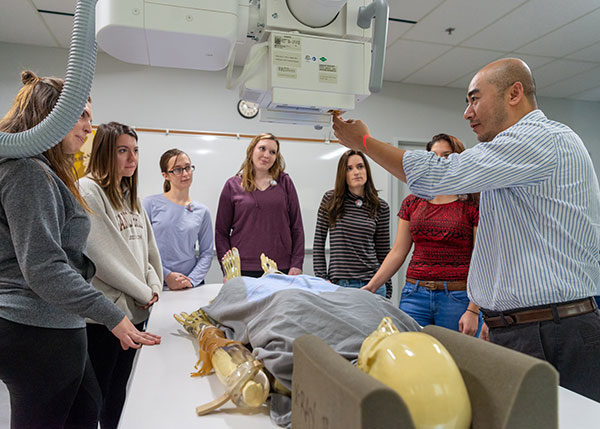Penn College celebrates work of radiologic technologists
Wednesday, November 7, 2018
Pennsylvania College of Technology’s radiography program celebrates the work of radiologic technologists during National Radiologic Technology Week, Nov. 4-10.
Providing patients with safe medical imaging examinations and radiation therapy treatments is the prime goal for the nation’s radiologic technologists.
 National Radiologic Technology Week was created by the American Society of Radiologic Technologists in 1979. It is celebrated each year during the week of Nov. 8, the day that German physicist Wilhelm Conrad Roentgen discovered the X-ray in 1895.
National Radiologic Technology Week was created by the American Society of Radiologic Technologists in 1979. It is celebrated each year during the week of Nov. 8, the day that German physicist Wilhelm Conrad Roentgen discovered the X-ray in 1895.
Medical imaging and radiation therapy professionals work with some of the most innovative equipment in the medical field to help identify pathologies, plan and administer treatment, and restore patient health.
Radiologic technologists can specialize in breast imaging, computed tomography, cardiac-interventional procedures, magnetic resonance imaging, nuclear medicine, ultrasound, radiation therapy and general diagnostic radiology.
Penn College offers an associate degree in radiography that can be continued to a bachelor’s degree in applied health studies: radiography concentration. The bachelor’s degree coursework is available online. To learn more, call 570-327-4519 or visit the School of Nursing & Health Sciences.
For information about Penn College, a national leader in applied technology education, email the Admissions Office or call toll-free 800-367-9222.
Providing patients with safe medical imaging examinations and radiation therapy treatments is the prime goal for the nation’s radiologic technologists.
 National Radiologic Technology Week was created by the American Society of Radiologic Technologists in 1979. It is celebrated each year during the week of Nov. 8, the day that German physicist Wilhelm Conrad Roentgen discovered the X-ray in 1895.
National Radiologic Technology Week was created by the American Society of Radiologic Technologists in 1979. It is celebrated each year during the week of Nov. 8, the day that German physicist Wilhelm Conrad Roentgen discovered the X-ray in 1895.Medical imaging and radiation therapy professionals work with some of the most innovative equipment in the medical field to help identify pathologies, plan and administer treatment, and restore patient health.
Radiologic technologists can specialize in breast imaging, computed tomography, cardiac-interventional procedures, magnetic resonance imaging, nuclear medicine, ultrasound, radiation therapy and general diagnostic radiology.
Penn College offers an associate degree in radiography that can be continued to a bachelor’s degree in applied health studies: radiography concentration. The bachelor’s degree coursework is available online. To learn more, call 570-327-4519 or visit the School of Nursing & Health Sciences.
For information about Penn College, a national leader in applied technology education, email the Admissions Office or call toll-free 800-367-9222.